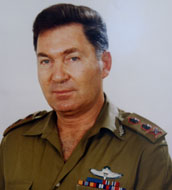Shomron Gives Report on Lebanon War, by Yaakov Katz (Jerusalem Post)


Commentary;
Embarrassment and shame seem to mean nothing to Dan Halutz! MB
Full Text;
The General Staff convened to hear former chief of staff Lt.-Gen. (ret.) Dan Shomron’s findings on Lt.-Gen. Dan Halutz’s performance during the war in Lebanon this past summer.
Shomron’s report did not detail steps to take against specific individuals in the IDF. Instead, the findings detailed a list of shortcomings in the transfer of orders from commanders to the soldiers in the field. Shomron also criticized the many changes made in operation plans during the war.
The report faulted the “late” decision to enlist reserve soldiers, the non-function of the Kirya military headquarters’ top command room, and the delayed declaration of the state of war.
On Monday, IDF officers holding the rank of colonel or higher will gather for a two-day conference during which Halutz and his generals will present the conclusions of the war as well as his plan for rehabilitating the IDF.
Shomron did not call for Halutz’s resignation, although he did criticize the chief of staff’s conduct during the war. Shomron raised concerns over the belated process of declaring war and of the call-up of reservists, among other criticisms. Halutz was not expected to resign from his post, and was going to wait for the publication of the interim findings of the government-appointed Winograd Commission, military sources said.
Former chief of staff Amnon Lipkin-Shahak told Army Radio on Friday morning that he did not think that Dan Shomron was afraid of addressing senior IDF officers’ behavior; rather, he thought Shomron was going to allow the officers to decide for themselves about their future.
“While personal decisions are more emphatic in people’s eyes, the real issue is garnering lessons related to what needs to be done in the military in order to ensure that if fighting is again necessary, then the army is ready to do so at higher standards than we saw this summer,” Lipkin-Shahak said.
Probes conducted by Maj.-Gen. (ret.) Amiram Levine and Maj.-Gen. Udi Shani-Shinotar, which were presented recently to the General Staff, reported that failures during the war stemmed in large part from deficiencies in overall planning and battle doctrine.
Levine, who investigated the Northern Command’s performance during the war, held Halutz personally responsible for its failures, claiming that the IDF’s battle doctrine was flawed. Shani-Shinotar went even further and accused Halutz of issuing confusing and contradictory orders that were in some cases changed on an hourly basis.